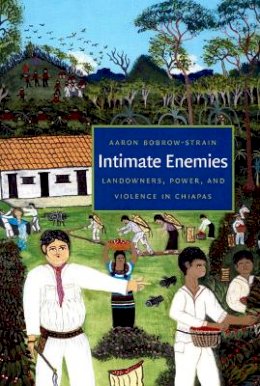Aaron Bobrow-Strain is Assistant Professor of Politics at Whitman College.
“Aaron Bobrow-Strain has made an invaluable, important contribution to our understanding of political conflict in Chiapas. This is the first book-length analysis in English that closely documents the landowners’ perspectives on the Zapatista uprising and the struggle for land since 1994. This is a very timely analysis that sheds light on the complex and shifting relationships between landowners, government officials, and agrarian organizations.”-Neil Harvey, author of The Chiapas Rebellion: The Struggle for Land and Democracy “Whether we knew it or not, Intimate Enemies is the book that we have been waiting for since at least 1994: the book about the other side of Chiapas’s rural society, its ladino landowners. Gracefully written, evocative, and wise, it is just superb.”-Jan Rus, coeditor of Mayan Lives, Mayan Utopias: The Indigenous Peoples of Chiapas and the Zapatista Rebellion “Intimate Enemies is a fascinating interdisciplinary book that will be valuable to social scientists interested in questions of land reform, landed production, state-society relations, and indigenous politics. . . . Bobrow-Strain has written a nuanced thick description deeply informed by the literature on landed production and hegemony. I recommend this book highly.” - Shannan L. Mattiace (Journal of Latin American and Caribbean Anthropology) “Intimate Enemies is one of the few ethnographies that focus instead on the elite and ask how do events (some global, others local) affect and perhaps marginalize this population as well. The strength of Bobrow-Strain’s work comes in his ability to effectively capture the ambivalent world of the landowners.” - Jeffrey H. Cohen (Ethnohistory) “A a fascinating ethnography and cultural history of the landed elites of ChilÓn in the northern zone of Mexico’s southernmost state of Chiapas. . . . The lesson of Bobrow-Strain’s excellent book is that not only peasants but also landowners respond to shifting circumstances in ways not predetermined by a generic class label.” - Richard Stahler-Sholk (Journal of Latin American Studies) “This is an important book that, in a logical and convincing manner, explains how landowners responded to the various pressures and tensions of their positions as local elites in an isolated area of Chiapas and why they ultimately accepted the loss of the land that had provided them with status and almost unassailable power. . . . Bobrow-Strain is to be commended for his facility in using oral and archival sources to provide what had been one of the missing pieces in the Chiapas puzzle.” - Todd Hartch (American Historical Review) “Bobrow-Strain makes a subtle and sympathetic contribution to understanding how landowning elites respond to agrarian conflict. An unexpected bonus is that the sensitivity and integrity of his insights is matched by the quality of his writing, making the book not only highly informative but a positive delight to read. . . . [Intimate Enemies] deserves to be read by anyone wishing to understand how complex power relations play out in the warp and weave of agrarian politics.” - Deborah Eade (Development in Practice) “The book is lyrically written, theoretically rich, and very interesting. It tells a story that has not been told before, and it challenges some deeply held conceptions of the history of land in Chiapas. For those who study Chiapas, it will immediately become an indispensable text. For those who study land, peasants, and agriculture-anywhere-this book makes clear that the other side of the story is part of the story itself.” - Courtney Jung (Comparative Politics) “This recent book by Aaron Bobrow-Strain is one of the most interesting, original, and important books about Chiapas (and, I think, about rural Latin America) that has been published in the last 20 years. . . . There are very interesting discoveries, arguments, and conclusions in this book that should be left to the reader to find, ponder, and enjoy.” - Thomas Benjamin (Hispanic American Historical Review) “Updating Marx’s argument that we take seriously the different historical surroundings of landed production, Bobrow-Strain focuses on the cultural politics of rural social relations. In doing so, he is able to paint a vivid picture, complete with colourful fieldwork anecdotes, of how individual landowners view their past, present and future. . . . Intimate Enemies is not only a valuable addition to the literature on rural politics in Chiapas, but also an important contribution to the broader comparative study of agrarian change.” - Neil Harvey (Journal of Agrarian Change)

